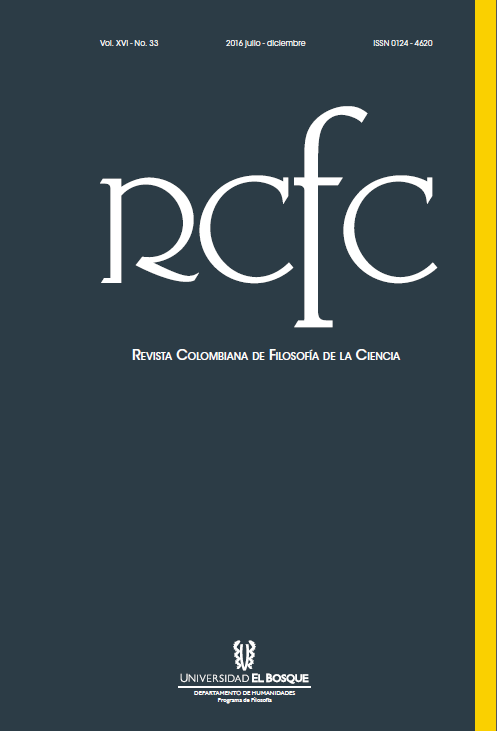Are Valid Evolutionary Debunking Arguments Against Creacionist Cognitive Science of Religion?
DOI:
https://doi.org/10.18270/rcfc.v16i33.1941Keywords:
evolutionary debunking arguments, theism, atheism, Hume, Plantinga, rationalityAbstract
According to Plantinga, identifying the cognitive mechanisms (postulated by the cognitive science of religion (SCR) to explain the belief in God) with the sensus divinitatis allows us to build a case for the rationality of theism, and even one for its truth. The aim of this paper is to show how the creacionist cognitive science of religion (CRSCR) argument for theism can be undermined, using two Debunking Evolutionary Arguments (DEA) inspired by Hume. DEA against the rationality of religious belief start from the claim that such belief is caused by processes that do not track the truth, and come to the conclusion that this belief is unwarranted or even false. Hume develops a DEA based on the idea of motivated irrationality and illusion of control, and a DEA based on religious diversity, both of which aim to show that such mechanisms are not reliable in generating theistic belief. I will argue that these two arguments pose serious problems to advocates of the externalist rationality of theism, and that Plantinga's appeal to the epistemic effects of sin (to justify the malfunction of the sensus divinitatis and deal with the AED), fails for various reasons and because it is possible to develop a logical defeater argument against the CRSCR.
Downloads
References
Atran, Scott. In Gods We Trust. New York: Oxford University Press, 2002.
Barrett, Justin. Why Would Anyone Believe in God? Walnut Creek: Altamira Press, 2004.
_____. “Is the spell really broken? Bio-psychological explanations of religion and theistic belief.” Theology and Science, 5 (2007): 57-72.
_____. “Cognitive Science, Religion and Theology.” The Believing Primate: Scientific, Philosophical, and Theological Reflections on the Origin of Religion. Ed. Michael Murray & Jefrey Schloss. New York: Oxford University Press, 2009. 76-99.
Boyer, Pascal. Religion Explained. New York: Basic Books, 2001.
Collier, Mark. “The natural foundations of religion.” Philosophical Psychology, 17.5 (2013): 665-680.
Darwin, Charles El origen de las especies. Barcelona: Planeta, 1992.
Dawkins, Richard. El espejismo de Dios. Madrid: Espasa Calpe, 2007.
Dennett, Daniel. Romper el hechizo. La religión como fenómeno natural. Buenos Aires: Katz, 2007.
Hume, David. Investigación sobre el entendimiento humano. Madrid: Ediciones Istmo, 2004.
_____. Historia natural de la religion. Madrid: Trotta. 2003.
Kahane, Guy. “Evolutionary Debunking Arguments.” Nous, 45.1. (2011):103-125.
Leech, David & Visala, Aku. “The Cognitive Science of Religion: A Modified Theistic Response.” Religious Studies, 47.3 (2011a): 301-316.
_____. “The Cognitive Science of Religion: Implications for Theism?” Zygon, 46.1 (2011b): 47-64.
Marsh, Jason. “Darwin and the Problem of Natural Nonbelief.” The Monist, 96.3 (2013): 349-376.
Pigden, Charles. “Subversive Explanations.” A new Science of Religion. Ed. Gregory Dawes & James MacLaurin. Abingdon: Routledge, 2013. 147-161.
Nozick, Robert. La naturaleza de la racionalidad. Barcelona: Paidós, 1995.
Plantinga, Alvin. Warranted Christian Belief. Oxford: Oxford University Press, 2000.
______. Where the Conflict Really Lies: Science, Religion, and Naturalism. London: Oxford University Press, 2011.
Wilson, David Sloan. Darwin`s Catedral: Evolution, Religion and the Nature of Society. Chicago: The University Chicago Press, 2002.
Downloads
Published
How to Cite
Issue
Section
License

This work is licensed under a Creative Commons Attribution-NonCommercial-NoDerivatives 4.0 International License.

| Article metrics | |
|---|---|
| Abstract views | |
| Galley vies | |
| PDF Views | |
| HTML views | |
| Other views | |











